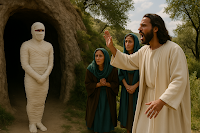7 On the last day of the feast, the great day, Jesus stood up and
cried out, “If anyone thirsts, let him come to me and drink. 38 Whoever believes in me, as the Scripture has said, ‘Out of
his heart will flow rivers of living water.’” 39 Now this he said about the Spirit, whom those who believed in him
were to receive, for as yet the Spirit had not been given, because Jesus was
not yet glorified (John 7:37-39).
I’ve heard several biblical teachers says that the Old
Testament Saints were regenerated because the Holy Spirit enabled them to work
on the tabernacle, rushed on them such as Saul and David. They say that prior
to Jesus’ glorification (the resurrection), the disciples were regenerate
because they couldn't believe unless the Holy Spirit enabled them.
But and this is a big but, it just doesn't square with these
verses. They were to receive a promise of surety for the future. Not just the
disciples but all who believed in him. Reiterating that it is the future, John
says the Spirit had not yet been given. If anyone knew when the Spirit was
given it should be John, one who received the Spirit.
So, what's the difference between Old Testament and New
Testament believers and receiving the Holy Spirit? Scripture is clear that Old
Testament people were saved by faith. But it is also evident that the Spirit
worked in and came upon Old Testament believers but didn't remain. It wasn't a
guarantee that the Holy Spirit would always be with them. David asked that the
Holy Spirit not be removed from him, by the Holy Spirit, he knew he could lose
the Holy Spirit just as Saul had (Ps 51:11). Also, there are enough references
in the Old Testament to a new covenant when our hearts would be changed in a
new way.
The provision of the Holy Spirit in the New Testament is
different. While we can grieve the Holy Spirit, He will never be removed from
us (John 14:16). So, we are thankful that we now have the Holy Spirit in our
hearts as Jesus promised but He wasn't given until Jesus was glorified.
I'm thankful for the security of my salvation. Not so I can
sin and not worry but that He is always with me to have this living water to
overcome sin and live and become more and more sanctified. Thank you, Jesus.







